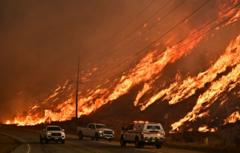According to the latest data from the European Copernicus Climate Service, 2024 has become the first year to surpass a global temperature of 1.5°C above pre-industrial levels, raising alarms as fossil fuel emissions persist. While not yet breaking the long-term average limit set by international accords, the alarming rise highlights the urgent need for worldwide action against climate change.
2024 Marks Global Temperature Spike, Approaching 1.5°C Threshold

2024 Marks Global Temperature Spike, Approaching 1.5°C Threshold
The year 2024 sets a new record for global temperatures, showcasing the ongoing impacts of climate change as the world edges closer to the critical climate limit.
As the world confronts escalating climate challenges, new data from the European Copernicus Climate Service reveals a significant milestone: 2024 is the first year to eclipse a global temperature of 1.5°C above the pre-industrial average. This record still falls short of formally breaching international climate targets, which dictate long-term averages over multiple decades, yet it underscores the growing urgency of the climate crisis spurred by relentless fossil fuel emissions.
UN Secretary-General António Guterres described the alarming run of temperature records as a "climate breakdown," emphasizing the necessity to swiftly reduce greenhouse gas emissions to avoid catastrophe. The Copernicus report indicates that global average temperatures in 2024 were approximately 1.6°C above pre-industrial levels. This figure not only surpasses 2023's record by over 0.1°C but also confirms that the last decade comprises the hottest years ever recorded.
Several climate organizations, including the Met Office and NASA, are anticipated to confirm these findings, though their precise figures may vary slightly. The primary driver behind last year's extreme temperatures remains humanity’s continued emissions of greenhouse gases like carbon dioxide. Although natural weather patterns such as El Niño contributed, the overwhelming influence on climate stability stems from human activity.
The significance of the 1.5°C threshold cannot be overstated; it has emerged as a potent symbol in climate negotiations since its endorsement during the Paris Agreement in 2015. Vulnerable nations regard this target as critical to their survival, as research illustrates that the risks associated with climate change—intense heatwaves, rising sea levels, and biodiversity loss—amplify with every incremental increase in global temperatures.
While it's challenging to predict when the long-term 1.5°C threshold may be crossed, climate scientists like Myles Allen from the University of Oxford warn that current trends suggest we may hit this mark by the early 2030s. However, the crossing of this threshold will not signify an irreversible calamity; rather, every fraction of a degree of warming matters as climate-related impacts progressively worsen.
In 2024, the globe has witnessed extreme weather events, including intense heatwaves in West Africa, droughts in parts of South America, and severe storms striking North America and South Asia—all exacerbated by climate change, as reported by the World Weather Attribution group. Notably, California has been grappling with destructive wildfires fueled by high winds and limited rainfall, underscoring the increasingly volatile climatic conditions.
As global temperatures soared, so too did seawater levels and atmospheric moisture, reshaping established climate patterns. The year was anticipated to be exceptionally hot due to lingering effects from El Niño, yet the notable extent of temperature records has startled many scientists, leading them to question if these changes herald an acceleration in warming trends.
Despite uncertainties surrounding these recent anomalies, experts assert that humanity retains the ability to mitigate future climate impacts through decisive action to curb emissions. The overarching message remains clear: while breaching the 1.5°C threshold appears imminent, preventing even higher temperatures is both crucial and achievable through concerted grassroots and global efforts to rein in greenhouse gas emissions.




















